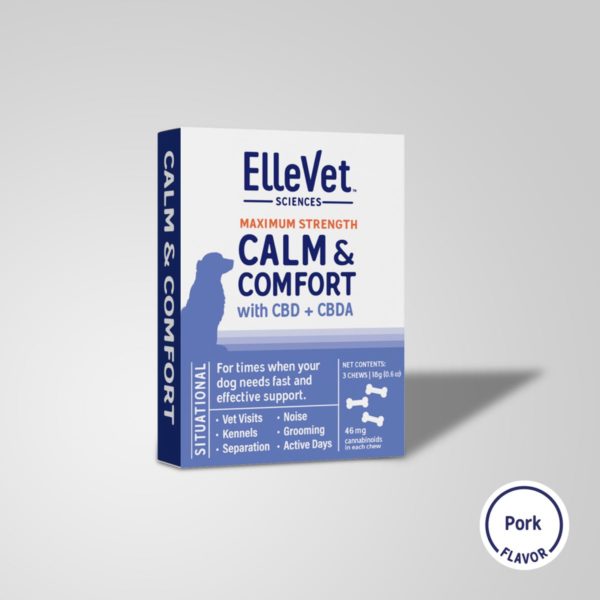Behavioral issues brought on by underlying anxieties or phobias have become more common in dogs. No matter what you try, it seems as though nothing works, and you feel terrible seeing your dog in distress. You are not alone, and in recent years, veterinarians have been prescribing medications to help combat these issues. A popular medication used in this area is Trazodone (Brand Names: Desyrel, Oleptro).
Table of Contents

What is Trazodone?
Trazodone is a commonly prescribed serotonin antagonist/reuptake inhibitor, or more simply, a “SARI”. SARI’s are antidepressant medications used to address and treat anxiety disorders or phobias in dogs. Loud noises, separation anxiety, vet visits and travel are examples of ailments found under this umbrella.
Common Applications:
- Noise Phobias (fireworks, thunderstorms, etc.)
- Veterinary Visits
- Kennel Stays
- Separation Anxiety
- Travel
- New People
- New Environment
The situations listed above bring on feelings of intense uncertainty. This leads to the stress and anxiety in your dog that comes with it. Although SARI’s like Trazodone may not be the first thing your veterinarian reaches for in terms of treatment for the initial diagnosis, these medications have been found effective for both dogs and cats that do not seem to respond to conventional therapies. If you’ve tried treatment after different treatment with no signs of relief from your dog, a SARI may be the answer you’ve been looking for.
How is Trazodone given to dogs?
Usually, medications like Trazodone are prescribed by your pets’ veterinarian as “off label”. Meaning, the dose and frequency you give Trazodone to your dog may differ immensely from what is listed on the bottle. This makes it especially important to consult your veterinarian and follow their instructions carefully.
As far as administration method, Trazodone is given to your dog orally, in tablet form. It can be given with or without food. Now, for some dog owners, the words “tablet” or “pill” can be loaded and layered. It’s no secret that some dogs will not accept a pill or tablet of any sort. Our loving friends that will eat anything suddenly turn into picky eaters (like they somehow know its medicine). This can obviously add another obstacle in trying to get your dog treatment. Although I’m sure you have methods of your own, hiding it in their favorite treat or wrapping it in a piece of cheese seems to work for some! Unfortunately, tablets are currently the only form Trazodone is available in.

Safety & Side Effects
Side effects from Trazodone are scarcely documented in dogs, as it is a very fast-acting drug, meaning it will not stay in your dog’s system for long.
Potential Side Effects:
- Dilated Pupils
- Sedation
- Vomiting
- Gagging
- Loss of Muscle Control
- Lethargy
- Increased Anxiety
- Increased Appetite
- Aggression
While this may seem like a lengthy list, you’ll be happy to hear that most side effects documented in dogs have been very mild, if they appear at all. Regardless, it’s important to understand and be on the lookout for any behaviors mirroring the ones listed above.
Trazodone is not recommended for pets who may be hypersensitive to these types of medications (SARI’s). Medications like Trazodone should be used with caution in dogs who have any severe heart and kidney problems (heart disease, kidney disease, etc.) And as is with most medications, if your dog is pregnant or nursing, speak with your veterinarian about the potential complications this could bring.
Drug Interactions
There are some known drug interactions that you should be aware of when considering Trazodone for your dog. Non-steroidal anti-inflammatory drugs (NSAID’s), Aspirin, depressants, and SSRI’s are examples of some medications that should be used with caution with Trazodone. When considering starting a new medication for your dog, go through any and all medications and supplements (prescribed or not) your dog is currently taking with your dogs’ veterinarian.
Storage
Storage is somewhat peculiar with Trazodone. It is recommended to store the drug at temperatures ranging from 77-86F in an airtight container. It is also recommended to keep the drug protected from sunlight.
Is Trazodone Right for Your Dog?
If your dog struggles with any of the conditions discussed, from fireworks to separation anxiety, Trazodone could be helpful. Although it is still considered “non-conventional”, that mold is quickly changing. If your dog has not responded to other forms of treatment, and their conditions have not improved, talk to your veterinarian about a SARI like Trazodone!
References:
https://vcahospitals.com/know-your-pet/trazodone





